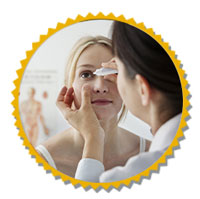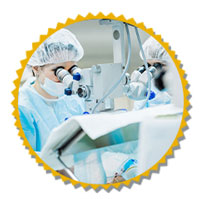Is Laser Eye Surgery Painful?
When you think of “laser eye surgery,” it’s not unusual to feel a little anxious. Maybe you’re thinking about traditional surgeries that use needles or other types of laser procedures that can cause discomfort like laser hair removal. Once you understand what the experience of LASIK surgery is actually like, you might be pleasantly surprised to hear that these concerns couldn’t be further from the truth.
If you think LASIK and PRK are dangerous, risky, or painful, you’re not alone. Dr. Richard Rothman and the team at LASIK of Nevada want to make sure everyone considering laser vision correction has a full understanding of the process. Once you realize how straightforward and comfortable the procedure is, it will help put your mind at ease.
The Process of LASIK Eye Surgery
What actually happens during laser eye surgery? Here’s a description of what happens before, during and after the LASIK procedure:

Before the Surgery
Your laser eye surgeon will put anesthetic (numbing) eye drops in your eyes so you don’t feel anything during the procedure except touch, stretch, and pressure. Your doctor will also use a gentle eyelid holder so you won’t have to worry about blinking during the procedure.

During the Surgery
- The entire process of laser eye surgery takes about 10 to 15 minutes but the actual laser time is usually far less than one minute per eye.
- After placing the numbing drops, your surgeon will then begin to prepare the eye for the laser reshaping process. This is accomplished in one of two ways depending on whether you’re having the LASIK or PRK procedure.
- During your LASIK procedure, one of the most important steps is to create a very thin “flap” on the surface of your eye. To perform this part of the procedure, your surgeon will use a specially designed laser called a femtosecond.
- You should not feel any pain during this part of the procedure, although you may feel variable amounts of a mild to moderate pressure sensation during this brief 20 to 30-second process.
- Most patients describe this pressure sensation as being similar to what you would feel when pressing two fingers firmly onto your closed eyelid.
- During this step of the procedure, you will also feel “touch and stretch”, but nothing painful.
- The next step is the laser reshaping process. Once this has been completed, the LASIK procedure is essentially complete.
- You will not feel anything painful during this part of the procedure either. The flap immediately re-attaches itself to the surface of the eye and no stitches are needed. The healing process begins at this time.
- In PRK, the same overall process is performed, but no flap is needed. The recovery time is longer after PRK but the visual results are virtually the same.

After the Surgery
- After LASIK surgery, your doctor will give you protective eyewear and eye drops. If you had PRK, your surgeon will place a soft contact lens on your eye to help it heal.
- Regardless of what procedure you’ve had, your surgeon will recommend that you go home and rest. We also advise that you use the provided eye protectors and avoid sleeping on your stomach.
- You’ll also be given an easy-to-follow eye drop schedule.
- The good news is, the surface of the eye is one of the fastest healing tissues in the body, which means that the recovery time for both PRK and LASIK is going to be shorter than you expect.
Is There Any Pain at the Beginning of Laser Eye Surgery?
If you’re still feeling anxious prior to your procedure, your doctor may elect to give you an oral medication to help you relax. You also won’t feel any pain at the beginning of the procedure because your LASIK surgeon will have already given you numbing eye drops.
Is There Any Pain During Laser Eye Surgery?
While most patients will feel touch, stretch, and pressure during the procedure, most patients are surprised by how little discomfort they actually feel. A helpful tip to put your mind at ease about any potential pain during your LASIK or PRK would be to talk to someone who has already had it done. It’s very likely that they were worried about the same things as you, but found the procedure to actually be much more comfortable than they expected.
The anesthetic drops will minimize any discomfort while the LASIK flap is being created as well as throughout the PRK procedure. There’s also no sensation of pain during the part of the procedure that reshapes the cornea with a laser.
Is There Any Pain After Laser Eye Surgery?
The only time after laser eye surgery that patients can potentially experience some discomfort is during the immediate recovery period. This is usually minimized by properly following your surgeon’s instructions, such as taking a nap and properly applying eye drops.
- LASIK patients typically experience minimal pain due to the quicker healing of the corneal flap
- PRK patients may feel discomfort because the cornea takes a bit longer to heal under the bandage contact lens
With either LASIK or PRK, you may experience some temporary discomfort such as stinging, tearing, or mild to moderate foreign body sensation. These symptoms can usually be successfully treated with over-the-counter pain medication.
It’s also not uncommon for some LASIK patients to occasionally experience temporary dryness of their eyes during the healing process. To maximize comfort, make sure to use artificial tears after any refractive surgery.
Other Things You Should Know About LASIK Eye Surgery Recovery
After LASIK, it’s important to know how much pain is normal and how long it should last. Mild to moderate discomfort may occur in the first few hours after LASIK, but it shouldn’t last for more than four to six hours.
After PRK, healing of the surface of the cornea should be complete five to seven days after the procedure.
The recovery process for LASIK and PRK also includes surface healing and vision stabilization, which is normally not associated with any pain.
Still Worried About Pain?
Does laser eye surgery hurt during the procedure? In most cases, it does not. However, it’s understandable for you to have concerns about pain as well as LASIK safety. The best first step to address your concerns about any procedure is to schedule a consultation where you can ask all your questions and learn if you’re a candidate for LASIK.
It’s helpful to rely on doctors and staff who are highly experienced with your procedure. Laser eye surgery is a safe and effective choice by millions of people worldwide each year. These procedures have enormous potential to painlessly improve the quality of your life.

Don’t Let Fear Get in the Way of Changing Your Life
LASIK is the most successful elective procedure in the history of medicine because it’s safe and effective.
If you’re interested about better vision or want to learn more about our LASIK promotions, contact us at at Las Vegas South: (702) 903-3448 or (775) 227-7947 or schedule a consultation.
